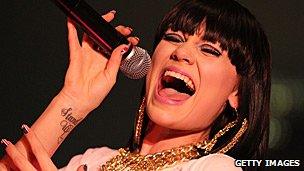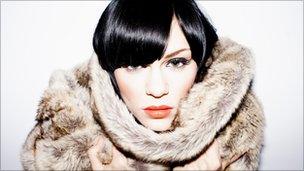BBC Sound of 2011: Jessie J
- Published
Jessie J talks about her music, success and health issues
Up-and-coming pop singer Jessie J is number one on the BBC Sound of 2011 list, which was compiled by asking 160 influential music critics, broadcasters and bloggers to name their favourite new acts.
Here are some of Jessie J's goals for the next 12 months: have a number one album, go on a headline tour, launch a perfume, set up charities and youth clubs around London, write a musical, do a duet with Leona Lewis and write Britney Spears' next hit single.
The 22-year-old is pretty well placed to have a go.
She has already co-written a US hit song, scored her own top 30 single in the UK, starred on the West End stage, been named the Brit Awards' Critics' Choice and now come top of the BBC Sound of 2011 list.
Not bad considering she is under doctors' orders to take it easy as a result of an irregular heartbeat and a minor stroke four years ago, after which doctors could not guarantee she would sing or walk properly again.
"It's one of those things that makes you think, OK, life isn't guaranteed for anybody," she says. "So it's time for me to turn this on and really do it justice."
Jessie J's first taste of showbusiness came at the age of 11 in Andrew Lloyd Webber's Whistle Down the Wind.
She went on to study musical theatre at the Brit performing arts school, which has nurtured the likes of Amy Winehouse, Adele, Katie Melua and Leona Lewis.
Preferring the pop stage to the West End, she joined a short-lived girl group before recording her first solo album aged 17. But just before her first single was due out, the label, Gut, went bust.

Jessie J co-wrote Miley Cyrus' hit single Party in the USA
"At the time it was very frustrating," she says. "But I can look back on it now and go, you know what, I'm glad I went through the tough times and was angry.
"It's made me a thicker skinned artist, and I think you have to be tough."
With no other UK record deals on the horizon, she started writing tunes for other artists. But a couple of showcase gigs in the US brought her to the attention of label bosses across the Atlantic.
In a rare move for a UK artist without a record deal at home, she was signed by a major label in the US. Universal Republic, her new home, clearly believe she has got what it takes to make it in the States.
Meanwhile, she has continued writing songs for other acts, including Miley Cyrus' Party in the USA, which reached number two in the US.
She was thinking about offering a composition called Do It Like A Dude to Rihanna - but changed her mind after asking advice from another collaborator, Justin Timberlake.
"He was like: 'No, keep it for yourself,'" she says.
That song turned into her first single - a barrage of in-your-face girl power that pitches her as a one-woman Spice Girls with added urban edge.
But other tracks, like Who You Are and Big White Room, are stirring ballads that let her exercise the soulful, soaring voice that will give Beyonce and Mariah a run for their money.
The West End background makes her a compelling performer as her face does its best to express every ounce of emotion in her songs, switching from euphoric to tender to angry in the space of a few lines.
The package is completed by a colourful image, seemingly unshakable confidence and a down-to-earth persona.
Despite her glam style, she speaks about wanting people to see she is "very human" and not just another airbrushed doll.
"I feel like a lot of the industry and media portray this image of what beautiful is, or how you should dress, or how you should look, and I don't think it's healthy," she says.
"I'm not a model, I'm an artist. In one of my videos I'm doing this shot of me with no make-up on where I've just woken up, and I don't think a lot of people would be comfortable enough to do that.

The singer has supported Chris Brown on tour
"But that's the way I look. This is who I am. Let's enjoy it. Let's just live life to the full while we're all here."
She wants her music to act as therapy for young people, she explains.
"I want young people to know that they can belong - whatever your culture, your religion, your sexuality - that you can live life how you want to live it and feel comfortable how you are."
It may sound corny, but this outlook is heavily influenced by her father, a social worker, whom she clearly idolises for his work helping vulnerable young people.
She talks about occasions when he has prevented people from killing themselves and says she is currently setting up a campaign for those searching the internet for advice on how to commit suicide.
"I want to create a place where, when they type in online 'how to kill myself', that comes up and it's a place of hope instead of a place of darkness," she says.
"I suppose that's what I want to do. I don't want to just sing."
Health problems
Her priorities are also based on her brushes with illness - in hospital in childhood "attached to a heart monitor, a weird shade of green", and suffering the stroke aged 18.
She only encounters problems now if she gets particularly tired, but cannot drink, smoke or do drugs.
"You know when people go: 'You're 18 and you've got all the time in the world?'" she says. "I was like: 'Well, no, I've just had a stroke and I don't think I do.'
"I want to be a role model and I've had to base my confidence on purity - I can't go on stage with a double G&T or a spliff in my body. I have to go on stage as me, because I can't do any of that stuff.
"I think it's really hard to be confident as yourself sometimes, and I think it's important for young people to know that.
"I think that's why my music uplifts people so much because they can see that I'm a normal chick who just wants to bring some goodness to the world."
- Published7 January 2011